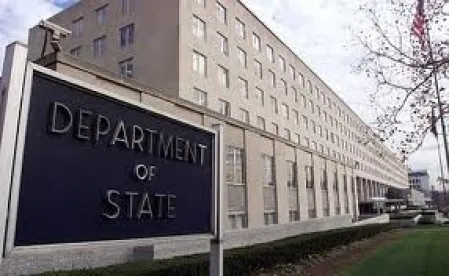Under the Act, secondary sanctions must be imposed on any US or non-US person, wherever located, that the US President determines has engaged in a “significant transaction” with any entity named on that list.
On October 26, 2017, the Trump Administration sent the US Congress the initial list of entities within the Russian defense or intelligence sectors as required by Section 231(d) of the Countering America’s Adversaries Through Sanctions Act of 2017 (CAATSA or the Act) (Pub. L. 115-44). Under the Act, secondary sanctions must be imposed on any US or non-US person, wherever located, that the US President determines has engaged in a “significant transaction” with any entity named on that list. The list appears on the US Department of State website.
In addition to the list, the State Department issued guidance that addresses some but not all of the questions raised by Section 231(d). Congress enacted CAATSA on July 28, 2017, and President Trump signed the legislation on August 2. The list transmitted to Congress meets the requirement of Section 231(d) that the US administration identify entities that are part of, or operate for or on behalf of, the defense or intelligence sectors of the Government of the Russian Federation, including the Main Intelligence Agency of the General Staff of the Armed Forces of the Russian Federation or the Federal Security Service of the Russian Federation.
The listed entities are not themselves sanctioned at this time (although certain listed entities were already subject to US sanctions, and this remains unchanged). No asset freezes or any other civil, administrative or criminal penalties have been imposed on the listed entities as a result of their inclusion on this list. Instead, Section 231 authorizes the administration to impose sanctions against any US and non-US person who engages in significant transactions with any of the listed entities (or has engaged in significant transactions with those entities since passage of the Act.)
The list issued under Section 231(d) is separate from other sanctions and designations, such as the US Department of the Treasury’s List of Specially Designated Nationals and Blocked Persons or the Sectoral Sanctions Identification List, and therefore other US sanctions in relation to Russia are unaffected by these designations and remain in force.
The key term “significant transaction” is not defined in the Act, but is addressed in the State Department’s guidance. That guidance provides that the US authorities will look at the “totality of the facts and circumstances” when deciding whether a transaction is significant for purposes of Section 231(d). The State Department describes some of the factors to be considered in determining significance, including
-
the significance of the transaction to US national security and foreign policy interests;
-
whether the transaction has a significant adverse impact on US national security and foreign policy interests;
-
the nature and magnitude of the transaction; and
-
the relation and significance of the transaction to the defense or intelligence sector of the Russian government.
Initially, these determinations are expected to focus on significant transactions of a defense or intelligence nature with the named entities. Thus, the State Department notes that “if a transaction for goods or services has purely civilian end-uses and/or civilian end-users, and does not involve entities in the intelligence sector, these factors will generally weigh heavily against a determination that such a transaction is significant for purposes of Section 231.”
The State Department’s guidance also carves out an apparent exception to the actions that constitute significant transactions, consistent with the approach used in General License 1 under the cyber-related sanctions.[1] Thus, the guidance provides that if
a transaction is necessary to comply with rules and regulations administered by the Federal Security Service, or law enforcement or administrative actions or investigations involving the Federal Security Service, including rules and regulations administered by the Federal Security Service for the importation, distribution, or use of information technology products in the Russian Federation and the payment of any fees to the Federal Security Service for such licenses, permits, certification, or notifications, then these factors will weigh heavily against a determination that that such transaction is significant for purposes of this section. (Emphasis added.)
Based on this guidance, we expect that the US will consider a broad range of factors when deciding whether an entity has engaged in a significant transaction with a listed entity. Consideration will likely be given not only to those factors set forth in the guidance, but other factors, such as the relevant party’s history of sanctions compliance, the country where the third party resides (in terms of that nation’s historical cooperation with US sanctions), and other foreign policy considerations. We expect, if and when regulations eventually issue, that those regulations will provide or be accompanied by guidance to further explain what types of payments may be made to the Russian Federal Security Service in connection with “licenses, permits, certifications and notifications” to address the commercial relationships and/or technology imports that will be permitted. These exceptions are especially important because they recognize that even otherwise significant transactions that occur should be permitted where they are necessary to comply with internal Russian laws and regulations.
Use of the term “initially” in the guidance indicates that the administration is leaving open the possibility that it may apply a broader definition of significance at a later time, which may not focus on the relatively narrow grounds enunciated in the current guidance.
Commencing on January 29, 2018, if the US determines that any person has knowingly engaged in one or more significant transactions with an entity on the Section 231(d) list, the Act requires the President to impose sanctions on that person. These must include five (5) or more of the twelve (12) sanctions listed in Section 235 of the Act. The Act does not require any US nexus for such transactions. Thus, a transaction between two non-US persons (one of which is on the Section 231(d) list), occurring outside of the US, could still trigger the sanctions (which is why they are defined as “secondary sanctions”). The Act allows the administration to consider good faith efforts to wind down ongoing transactions, permitting the President to delay the imposition of sanctions with respect to a person if the President certifies to the appropriate Congressional committees, not less frequently than every 180 days while the delay is in effect, that the person is substantially reducing the number of significant transactions.
Section 235 identifies the sanctions that may be imposed and from which the President must select when taking action against any person found to have conducted significant transactions with an entity from the list:
(1) ExIm Bank. Denial of financial guarantees or certain other support for exports from the Export-Import Bank of the United States
(2) Export License Ban. A ban on the issuance of a broad range of US Government licenses or authorizations for the export of US goods or technology to the sanctioned person
(3) Ban on Loans from US Financial Institutions. A ban on any loans from US financial institutions totaling more than $10 million in any 12-month period, except for loans for activities “to relieve human suffering”
(4) Ban on US Support for Loans from International Financial Institutions. US opposition to any loan from an international financial institution that would benefit the sanctioned person
(5) Measures against Financial Institutions. If the sanctioned person is a financial institution, the US may prohibit its designation as a primary dealer in US Government debt instruments, or as an agent of the US Government or repository for US Government funds
(6) Procurement Ban. A ban on any procurement by the US Government of goods or services from the sanctioned person
(7) Ban on Foreign Exchange Transactions. A ban on transactions in foreign exchange “that are subject to the jurisdiction of the United States and in which the sanctioned person has any interest.” This would include transactions cleared through the US financial system
(8) Ban on Banking Transactions. A ban on any “transfers of credit or payments between financial institutions or by, through, or to any financial institution,” to the extent that these “are subject to the jurisdiction of the United States and involve any interest of the sanctioned person”
(9) Ban on Property Transactions; Asset Freeze. The US President may prohibit any person from acquiring, holding or transacting with “any property that is subject to the jurisdiction of the United States and with respect to which the sanctioned person has any interest.” Effectively this would mean that any assets of the sanctioned person in the US would be “frozen” or blocked
(10) Ban on Debt or Equity Investments. A ban prohibiting any US person from investing in or purchasing “significant amounts of equity or debt instruments of the sanctioned person”
(11) Visa Ban for Corporate Officers, Principals and Shareholders. The US may deny visas to any “corporate officer or principal of, or a shareholder with a controlling interest in, the sanctioned person”
(12) Sanctions on CEOs. The US may impose any of the sanctions listed in items (1) – (11) above against “the principal executive officer or officers of the sanctioned person, or persons performing similar functions and with similar authorities as such officer or officers”
The last item is of particular note because in the past US sanctions have not routinely resulted in action against the individuals inside a company. While this has happened on rare occasions, the inclusion of this provision provides an extra tool that can be used to discourage significant transactions with these entities. Whether the Trump Administration elects to make use of this measure remains to be seen.
Civil and Criminal Penalties. In addition to the myriad sanctions available, CAATSA provides for possible civil penalties and/or criminal fines and imprisonment under Section 231(e).[2]
Since this is the first implementation of Section 231(d) of the Act, the above provisions raise a number of issues regarding future interpretations and enforcement of these secondary sanctions. Although the State Department issued limited guidance on the list, we expect the US and international business communities to seek further clarifications.
The State Department guidance also indicates that the US intends to work with persons considering transactions with listed entities “to help them identify and avoid engaging in potentially sanctionable activity” and with allies and partners, including “European and other key partners“ in such matters. These comments suggest that the US authorities are open to consultation with companies concerning the interpretation of secondary sanctions arising from the 231(d) list, as well as European and other partners who may have concerns about the economic effects of these sanctions.
At present, US or non-US persons that may have engaged in one or more “significant transactions,” on or after August 2, 2017, with a Russian entity named in the list—or plan future business—should consider whether it needs to restructure existing or anticipated engagements. Careful planning and consideration of the factors noted above, in addition to possible consultation with the US government may be useful to assist companies when navigating potential liabilities under this statute.
[1] Office of Foreign Assets Control (OFAC) General License No. 1, dated February 2, 2017, authorizes certain fee payments, but is separate from any designations under Section 231(d).
[2] This is due to the incorporation by reference into the Act of Section 206 of the International Emergency Economic Powers Act (50 U.S.C. 1705).







 />i
/>i

